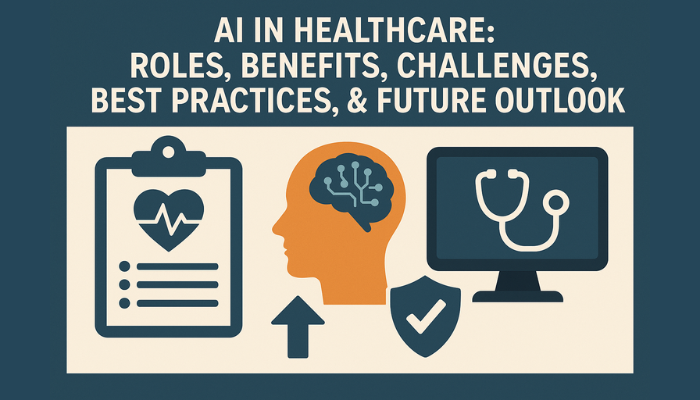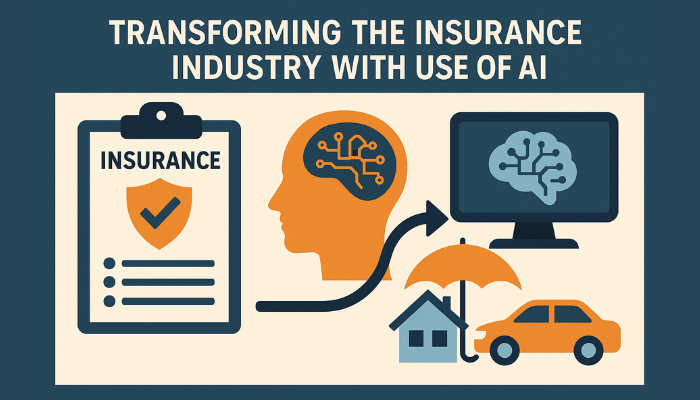AI in healthcare is changing the way you collect, analyze, and use data to make faster, smarter decisions. From improving diagnostics to streamlining operations, artificial intelligence is now a key part of healthcare data analytics and informatics.
The U.S. AI in the healthcare market was valued at USD 11,819.4 million in 2023 and is expected to surge to USD 102,153.7 million by 2030. This massive growth shows why AI is now a strategic priority: it helps reduce costs, improve patient outcomes, streamline operations, and unlock faster, data-driven decisions, key goals for any modern healthcare organization.
In this blog, you’ll learn what AI in healthcare is. We’ll cover its key roles in analytics, top applications in informatics, benefits for data management, challenges, best practices, and what the future looks like.
What Is AI in Healthcare?
AI in healthcare refers to the use of AI technologies to process medical data, perform tasks, and support decisions that traditionally required human intelligence. It involves algorithms and models that can learn from healthcare data, like patient records, medical images, lab results, and real-time monitoring, to identify patterns, make predictions, and generate insights.
With a clear picture of what AI in healthcare means, let’s explore the specific roles it plays in transforming how healthcare data is analyzed and used across your organization.
Key Roles of AI in Healthcare
AI is helping healthcare organizations like yours make smarter use of data, driving better clinical outcomes, cost savings, and operational agility. Here is a look at how it’s transforming different areas of healthcare:
1. Enhanced Disease Detection and Diagnosis
AI improves the accuracy and speed of identifying health conditions by analyzing complex medical data.
- Early Detection of Serious Conditions: AI scans large datasets, like Magnetic Resonance Imaging (MRIs), Computed Tomography (CT) scans, and lab reports, to catch diseases such as cancer and heart failure in early stages.
- Identifying Hidden Patterns: Algorithms recognize patterns in medical records and images that may be missed by the human eye.
- Real-Time Disease Tracking: AI enables continuous monitoring, allowing you to track treatment progress and detect complications as they arise.
- Reducing Diagnostic Errors: With more precise analysis, AI helps lower the rate of misdiagnoses, which are a costly and common issue in healthcare.
2. Predictive Analytics for Risk Forecasting
AI allows you to predict future health events so you can intervene early and manage resources better.
- Forecasting Health Risks: AI models use patient history, wearable data, and even environmental inputs to identify potential health threats before they occur.
- Identifying At-Risk Patients: Predictive analytics highlights individuals more likely to develop chronic diseases or suffer acute episodes.
- Anticipating Care Demand: AI forecasts hospital admissions and emergency department usage, helping you optimize staffing and facility usage.
- Reducing Unplanned Events: By acting early on AI insights, your teams can avoid costly ER visits and readmissions.
3. Data-Driven Personalized Treatment
AI enables truly individualized care by tailoring treatments based on multiple patient-specific data points.
- Combining Genetic, Clinical, and Lifestyle Data: AI integrates these data sets to recommend treatments suited to each patient’s unique profile.
- Precision Medicine in Practice: Especially in oncology, AI matches genetic markers with targeted therapies that improve survival and reduce side effects.
- Real-Time Decision Support: AI tools assist clinicians with live, data-backed treatment options at the point of care.
- Improving Patient Outcomes: Personalized care leads to better results and fewer complications, helping increase both patient satisfaction and treatment success rates.
4. Automation for Operational Efficiency
AI reduces manual workload, streamlines workflows, and lowers operational costs across departments.
- Automating Repetitive Tasks: AI handles billing, scheduling, and claims processing, saving time and reducing human error.
- Real-Time Data Entry and Updates: It processes unstructured clinical data and updates patient records automatically, improving accuracy.
- Ensuring Regulatory Compliance: AI helps maintain clean, compliant data with built-in checks and audit trails.
- Freeing Up Staff Time: Automation allows staff to focus more on care delivery and strategic planning instead of paperwork.
5. Accelerated Drug Discovery and Innovation
AI reduces time, cost, and uncertainty in research and development processes.
- Simulating Drug Interactions: AI models predict how new compounds might react in the body, narrowing down the most promising candidates.
- Analyzing Research Data at Scale: It processes thousands of studies, trial results, and molecular structures faster than traditional methods.
- Shortening R&D Timelines: AI helps your team move from discovery to testing to trials in less time.
- Increasing Market Readiness: With faster and smarter development, you improve your chances of bringing breakthrough treatments to patients first.
6. Real-Time Remote Patient Monitoring
AI-powered devices help you manage patient health continuously, even outside clinical settings.
- Tracking Vital Signs 24/7: Wearables and connected tools measure heart rate, oxygen levels, blood sugar, and more in real time.
- Instant Alerts for Anomalies: When AI detects unusual patterns, it sends alerts to providers or patients immediately for action.
- Reducing Hospital Readmissions: Early intervention prevents health declines that would otherwise lead to hospital visits.
- Supporting Chronic Disease Care: AI helps manage long-term conditions more effectively, improving outcomes and reducing costs.
7. Insight Extraction from Unstructured Data
AI makes sense of the massive amount of unstructured healthcare data generated every day.
- Processing Clinical Notes and Documents: Natural Language Processing (NLP) tools scan physician notes, discharge summaries, and emails to extract useful data.
- Accelerating Decision-Making: With quick access to critical insights, your teams can act faster and more confidently.
- Reducing Manual Review Time: AI eliminates the need for staff to sift through pages of text, saving hours of work.
- Staying Informed and Compliant: It ensures your organization stays ahead of the curve in both clinical practices and regulatory needs.
8. Advanced Population Health Management
AI gives you a broader view of community health trends to guide better decisions at scale.
- Spotting Trends Across Populations: AI highlights patterns and high-risk areas across thousands or millions of patient records.
- Designing Targeted Health Programs: Use insights to launch preventive initiatives that address the needs of specific groups.
- Optimizing Resource Allocation: AI shows where to direct staffing, equipment, and funding for the greatest impact.
- Strengthening Value-Based Care Strategies: AI helps you demonstrate improved outcomes and cost-effectiveness to payers and regulators.
Ready to Deliver Smarter, Predictive Care?
Discover how AI-powered diagnostics and predictive models can help your team detect diseases early, personalize treatment, and improve patient outcomes.
Schedule a Call to see how Codewave’s AI and machine learning solutions can support your clinical goals.
Also Read: How Blockchain Technology Works in the Healthcare Sector
Now that you’ve seen how AI is actively shaping healthcare analytics, it’s just as important to look at the real benefits it brings to managing and making sense of complex healthcare data.
Benefits of AI in Healthcare Data Management
Managing healthcare data is no longer just about storage, it’s about using it to drive better decisions, reduce costs, and improve outcomes. AI helps you do exactly that by transforming how data is collected, organized, secured, and used across your entire organization. Below are some of the most valuable benefits of using AI in healthcare data management:
1. Faster Access to Clean and Organized Data
AI helps you find the right data quickly by organizing, cleaning, and managing it automatically.
- Instead of sorting through messy records, AI tools flag missing lab results or incorrect patient IDs in Electronic Health Records (EHRs).
- This ensures your teams work with complete and accurate data, speeding up clinical and operational decisions.
- For example, AI-based data cleaning tools help reduce delays in emergency care by giving doctors instant access to the correct patient history.
2. Lower Operational Costs
AI cuts routine expenses by handling repetitive tasks like data entry, billing, and scheduling.
- Insurance companies use AI tools, like IBM’s Watson, to classify medical procedures and process claims automatically, saving on manpower and reducing errors.
- Hospitals can also use AI to predict supply needs, helping you manage inventory and avoid waste.
3. Stronger Data Security and Compliance
AI protects your data and helps you stay compliant with healthcare regulations.
- It monitors access patterns, detects unusual activity, and alerts your team to potential breaches in real time.
- AI also automates audits by reviewing thousands of documents for Health Insurance Portability and Accountability Act (HIPAA) compliance.
- For example, Natural Language Processing (NLP) and Optical Character Recognition (OCR) tools scan hospital records and ensure reports are accurate and submitted on time.
4. Scalable Systems That Grow With You
As your organization expands, AI helps you manage growing volumes of data without slowing down.
- AI systems easily integrate with your current setup and support new services, departments, or patient groups.
- A large hospital network can use AI-driven analytics to manage patient data from multiple locations, keeping care consistent and compliant across the board.
5. Smarter Insights from Complex Data
AI helps you turn detailed medical data into clear, useful insights.
- It processes both structured data (like lab results) and unstructured data (like doctor’s notes or imaging reports).
- NLP tools can pull insights from oncology records to show which treatments work best for specific patients.
- IBM’s Watson for Oncology uses AI to recommend personalized cancer treatments based on each patient’s history and genetics.
6. Predictive Maintenance for IT Systems
AI keeps your systems running smoothly by spotting issues before they cause downtime.
- It analyzes system usage and performance data to predict when maintenance is needed.
- This means fewer surprises, better uptime, and no last-minute scrambles to fix broken systems.
- Your IT team gets alerts early, so critical data stays accessible when you need it most.
7. More Time for Strategic Projects
By automating everyday data tasks, AI gives your team more freedom to focus on what matters most.
- Instead of spending hours on data checks and reports, your teams can invest that time in innovation, digital transformation, and improving patient experience.
- For example, automating compliance reports allows your compliance staff to focus on planning for new initiatives rather than reviewing paperwork.
Want to Connect Systems and Teams Seamlessly?
Build a unified healthcare ecosystem with blockchain-powered data sharing, hospital portals, and patient engagement platforms, all integrated and secure.
Book a call to explore how Codewave enables cross-industry collaboration and secure data interoperability in real-time.
While the benefits of AI in healthcare data management are clear, it’s just as important to recognize the challenges that come with implementation, especially when dealing with sensitive data, regulations, and real-world clinical workflows.
Challenges in Implementing AI in Healthcare Informatics
While AI offers powerful advantages in healthcare analytics and informatics, bringing it into your organization isn’t without challenges. To make AI work effectively, you need to plan for the obstacles that could impact both adoption and long-term value. Here are the key challenges you should be aware of:
1. Data Privacy and Security Risks
AI systems need access to large amounts of patient data, which raises serious privacy concerns.
- There’s always a risk of data breaches, unauthorized access, or accidental leaks of sensitive health information.
- Strict regulations like HIPAA must be followed, and non-compliance can lead to heavy fines or legal trouble.
- Ensuring strong security measures and secure data handling is a must before scaling any AI solution.
2. Bias in AI Models
If your AI tools are trained on incomplete or biased data, they can deliver unfair or inaccurate results.
- This can lead to wrong diagnoses or unequal treatment, especially for underrepresented patient groups.
- Using diverse, high-quality datasets helps reduce this risk and ensures more reliable outcomes for everyone.
- Regular audits and bias checks are also key to keeping AI systems fair and effective.
3. Lack of Transparency
Many AI tools act like “black boxes,” offering results without clear explanations.
- This can make your clinical staff hesitant to trust or rely on AI recommendations.
- When doctors can’t understand how decisions are made, it slows down adoption.
- That’s why explainable AI models are important—they help build confidence and support informed care decisions.
4. Workflow Integration Issues
AI tools often struggle to fit into existing clinical workflows without causing disruption.
- If the technology doesn’t work smoothly with your current systems or slows down daily operations, staff pushback is common.
- Interoperability with Electronic Health Records (EHRs) and other platforms is crucial for success.
- Proper training and thoughtful rollout plans help make AI tools part of the process, not a burden.
5. Regulatory and Ethical Uncertainty
Healthcare regulations around AI are still evolving, which can create confusion.
- It’s not always clear who is responsible if an AI system makes a mistake.
- You also need to think about consent, data ownership, and how patient data is used.
- Having clear policies and following ethical guidelines can help you use AI responsibly and protect your organization.
6. High Implementation Costs
AI technology often requires significant upfront investment in tools, infrastructure, and support.
- Ongoing maintenance, updates, and training also add to the total cost.
- Smaller healthcare providers may struggle to justify the spend, even if long-term ROI is promising.
- Starting with smaller pilot projects can help manage costs while proving value early.
7. Over-Reliance on AI Without Human Checks
AI is powerful, but it’s not perfect, and shouldn’t replace human judgment.
- There’s a risk that teams might rely too much on AI and miss errors or blind spots.
- Keeping humans in the loop ensures better oversight and helps avoid serious mistakes.
- The best results come when AI supports, not replaces, your clinical and operational expertise.
Looking to Improve Operational Efficiency?
Automate admin tasks, reduce billing errors, and optimize resource planning using Codewave’s IoT, cloud analytics, and AI-backed tools.
Contact us to learn how we can help you streamline operations and scale with confidence.
Also Read: AI Transformations in Pharmaceutical Drug Development
While these challenges are real, they’re not impossible to overcome, especially when you follow a well-structured approach to adopting AI in your data systems.
Best Practices for Adopting AI in Healthcare Data Systems
Adopting AI in healthcare can bring powerful improvements across clinical and operational areas, but to get real results, it’s important to follow a clear, well-planned approach. These best practices will help you build a solid foundation and scale AI successfully within your organization.
1. Set Up Clear AI Governance
The first step is to establish a strong framework for managing all AI efforts in your organization.
- Assign specific people or teams to lead AI strategy, risk management, and compliance.
- Create clear policies for how AI will be used, especially in areas involving patient data.
- Make sure your systems meet healthcare regulations like HIPAA from day one.
This structure keeps everything aligned: your goals, responsibilities, and regulatory obligations.
2. Align AI with Business Goals
AI works best when it’s solving real business problems.
- Before you invest, define exactly what you want AI to achieve. Are you trying to lower costs? Improve clinical outcomes? Speed up workflows.
- Once your objectives are clear, set measurable targets so you can monitor performance and return on investment.
By tying AI projects to your top priorities, you’ll see value faster and more consistently.
3. Make Data Quality and Security a Priority
AI’s performance depends entirely on the quality of your data.
- Start by making sure your data is accurate, up to date, and consistent across all systems.
- Put strong security in place: encryption, access control, and regular audits are a must.
- High-quality, well-protected data not only improves results but also protects your organization from compliance risks and reputational damage.
4. Start with High-Impact and Low-Risk Use Cases
You don’t have to overhaul everything at once.
- Begin with smaller projects that are easy to measure and quick to implement, like automating appointment scheduling or claims processing.
- Look for use cases that provide a clear business case without disrupting critical operations.
- These early wins help build confidence across your team and create momentum for larger projects.
5. Build Cross-Functional Teams
AI affects every part of your organization, so it’s important to bring in all the right voices early.
- Involve clinicians, IT leaders, compliance officers, and operations teams from the start.
- Encourage collaboration between departments to ensure AI tools meet both technical and clinical needs.
- This kind of cross-functional approach helps avoid blind spots and ensures smoother implementation.
6. Fit AI Into Existing Workflows
For AI to be adopted successfully, it needs to make everyday work easier, not harder.
- Choose tools that integrate well with your current systems and don’t require major workflow changes.
- Make sure staff can adopt the tools without needing extensive retraining or extra steps.
- When AI complements what your team already does, adoption becomes natural, and results come faster.
7. Use Transparent and Explainable AI
People need to trust the tools they use, especially in clinical settings.
- Select AI solutions that show how decisions or recommendations are made, not just the final result.
- Avoid black-box models that make it hard to understand the reasoning behind outputs.
- Clear, explainable AI makes it easier for clinicians and staff to use the technology confidently and responsibly.
8. Train Your Teams and Prepare for Change
Adopting AI isn’t just a tech shift; it’s a cultural shift.
- Offer hands-on training tailored to different roles so everyone knows how to use the tools effectively.
- Communicate openly about what’s changing, how it affects day-to-day work, and how it will help in the long run.
- Proper training ensures smoother transitions and higher engagement from your teams.
9. Track Performance and Keep Improving
AI isn’t a one-time project. It needs regular checks to stay effective.
- Monitor how AI tools are performing and compare their results to real-world outcomes.
- Be ready to update models as your data evolves or regulations change.
- This ongoing maintenance helps you catch issues early, maintain accuracy, and continuously improve performance.
10. Plan Ahead for Scale and Long-Term Support
Think beyond pilots or short-term wins, look at how AI will grow with your organization.
- Create a roadmap for expanding successful AI tools to other departments or facilities.
- Budget for ongoing support, software updates, retraining, and compliance reviews.
- Scaling properly ensures that AI becomes a sustainable part of your operations, not just a temporary experiment.
Also Read: Edge Computing in Healthcare: 5 Use Cases for Digital Health
Once you’ve set up the right approach, it’s just as important to stay ahead of what’s evolving. Let’s explore how AI is continuing to shape the landscape of healthcare analytics and informatics.
Future Outlook of AI in Healthcare Analytics and Informatics
AI is quickly changing the way healthcare organizations work with data, offering smarter ways to manage patients, operations, and clinical outcomes. As this technology continues to evolve, you’ll see new opportunities that support faster decisions, stronger care delivery, and better business performance. Here’s what’s coming next:
1. Smarter and More Proactive Decisions
AI will help shift care from reactive to proactive by forecasting patient needs and resource demands. Predictive and generative tools will analyze both structured and unstructured data. This supports faster, context-aware decisions and timely interventions.
2. Seamless Data Integration Across Systems
AI will improve interoperability between EHRs, labs, imaging, and insurance platforms. This ensures smoother data flow across care providers and better coordination. Tools like digital twins will simulate operational changes before real-world rollout.
3. Greater Efficiency in Clinical and Admin Workflows
AI will automate tasks like billing, coding, and claims processing, cutting down manual errors. Technologies like ambient listening and machine vision will ease documentation and boost patient safety. This frees up your staff to focus more on care delivery.
4. More Personalized and Predictive Patient Care
AI will tailor treatments using data from genetics, lifestyle, and clinical history. It will also flag at-risk patients earlier through predictive models. This leads to better outcomes, reduced costs, and more effective preventive care.
5. Stronger Security and Compliance
AI will monitor for threats, detect unusual access patterns, and protect sensitive data in real time. Automated tools will help meet HIPAA and regulatory standards with less manual effort. This strengthens both data security and compliance management.
6. A Bigger Focus on Ethical and Transparent AI
Explainable AI models will clarify how results are generated, boosting clinician trust. Ethical frameworks will guide the responsible use of patient data and recommendations. Transparency will be key to clinical adoption and long-term success.
As AI continues to develop, success will depend on choosing the right partner to help you turn possibilities into real-world outcomes. This is where Codewave comes in.
How Codewave Helps Drive AI-Powered Innovation in Healthcare?
As healthcare shifts toward personalized, AI-driven, and hyper-connected experiences, you need more than just tools, you need a strategy that ties everything together. Codewave helps healthcare organizations like yours build integrated Data and AI systems that enable faster decisions, deeper patient engagement, and better outcomes at scale. From diagnosis to patient care coordination, Codewave empowers your team to deliver real-time value at every step.
Here’s how Codewave supports healthcare transformation through AI and advanced digital systems:
- AI-Driven Diagnosis, Prognosis & Predictive Care: Use AI and ML to assist doctors in early detection, risk prediction, and treatment planning with data-backed accuracy.
- Personalized Patient Engagement Platforms: Develop intelligent web and mobile apps for patient-doctor interactions, online consultations, and on-demand care, improving access at moments of high need.
- Custom Diagnostic & Prognostic Software: Build tailored tools that support clinical decision-making and detect complex diseases through advanced scan recognition and patient profiling.
- IoT and Cloud-Based Patient Monitoring: Use IoT to track patient vitals and behavior, combined with cloud analytics for real-time insights and timely medical response.
- Predictive Analytics for Health Trends: Apply predictive modeling on large datasets to identify health patterns, understand population risks, and plan preventive strategies more effectively.
- Blockchain-Powered Data Security: Ensure privacy and secure collaboration using private Blockchain platforms that protect patient records while enabling seamless data sharing across healthcare partners.
- Integrated Portals for Hospitals and Clinics: Launch fully branded hospital portals and websites that allow patients to access services, view records, and schedule visits with ease.
- Cross-Industry Collaboration Platforms: Enable connectivity between hospitals, diagnostic centers, insurers, and pharma companies using unified systems built for smart healthcare ecosystems.
With Codewave, you’re not just implementing AI—you’re creating a digitally connected healthcare experience built around patient needs, clinical efficiency, and data-powered intelligence. Whether you’re modernizing existing platforms or building something entirely new, Codewave helps you do it with speed, precision, and care.
Ready to see how it works? Connect with us and explore what Codewave can do for your healthcare organization.
Codewave is a UX first design thinking & digital transformation services company, designing & engineering innovative mobile apps, cloud, & edge solutions.






